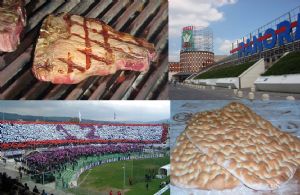I was in the COOP carrying a basket in one hand and steering a buggy (‘stroller’ to our American readers) with the other. Having already loaded the basket with heavy items upstairs, I now needed to bag and weigh the fruits and vegetables. In Italy, this task necessitates dressing your hand with a glove, selecting and bagging your produce, finding a weighing machine that hasn’t run out of tickets and staking your claim to it. Not a particularly easy operation when you have your hands full.
I parked my baby daughter in line of sight, away from the busy scales. Whilst waiting my turn I saw a lady of a certain age, sporting the fur coat that appears to be mandatory in Italy between the months of November and March, alternately looking at my baby and searching the faces of the other customers in the aisle. As time progressed, a concerned look crept across her brow; something was obviously worrying her. Then she registered me watching her.
She gestured to ask if the baby was mine. ‘Yes, she’s mine,’ I said. And thus began a stream of heartfelt invective: chastising me for leaving my baby unattended, for not having held her ‘close to my heart.’ She delivered an impassioned lecture on parenting before wandering off to the fish counter, no doubt to instruct the fishmonger on how to fillet his spigola.

This encounter happened early on in our stay in Florence, and though it wasn’t something completely unexpected, it left me feeling slightly deflated. I thought, ‘What if I had been a nonna doing the same thing, or a mamma? Would I then have been subjected to this unnecessary lesson in parenting? Is there an inherent assumption that men don’t really know how to look after children here?’
In the UK, television adverts are rife with male characters who can’t cook dinner for their family, can’t operate the washing machine, or are plain lazy and stupid. Yet there is little public opinion in Great Britain that these depictions mirror reality. I began to wonder if the same applied in Italy.
Here, the response to the news that I am a stay-at-home dad (a casalingo) is met with a mixture of bewilderment – a couple of men have looked at me like I am mad (‘So, you don’t have a job? You’ll be looking after the baby all day!’) – praise (Complimenti! Che bravo! was the response when I was being introduced to various vendors during a market tour) and indifference.
I may be paranoid, but I sometimes feel that, being English, and hence a straniero, I am already so alien in my behaviour to some Italians that something as unusual as being the primary caregiver is to be expected. I’ve come to the conclusion that I am a rarity here, more so than at home in England.
I asked my older daughter to ask some of her school friends what they thought of the fact that I was staying at home to look after the baby. After the inevitable boh, the most popular response was that it wasn’t the looking after baby that was unusual, it was the not working! ‘Your dad doesn’t have a job?’ may be a reflection of the families whose kids go to our school or may be a reflection of Florence (or Italy) itself. Boh!
Before coming to Italy with the children, I was well aware of the importance of nonni when it came to bringing up baby. We Brits can be envious of the ‘free’ childcare they offer (amongst my peers, living in the same city as your parents is unusual). Having i nonni at hand to help with the childcare may explain, in part, the low numbers of men doing what I do.
My main interest, other than changing nappies, is food; and it is the desire to experience all the food that Florence has to offer that has been my principle motivation for leaving the house and interacting with Florence and its inhabitants. Having the baby with me has both facilitated and hindered this quest.
When I want to head to Mario’s for lunch or to pop into Verrazzano Cantinetta for some foccaccia or an espresso, I falter at the first hurdle. Getting inside these places is nigh on impossible, as many of Florence’s finest gastronomic attractions were not designed to accommodate customers with buggies.
At the Sant’Ambrogio market, however, I became quickly recognisable as the English dad with the cute bambina. Here, my choice of stallholders has not been entirely based on the quality of their produce but, in part, on their response to my baby. Dote on my daughter and I’ll be buying your carciofi! Likewise, at the bakers, a piece of schiacciata is handed over for baby to chew on whilst the ladies coo over her and, if I’m lucky, praise me for being such a good father.
Whether this attention is because she is with her babbo or not, I do not know (my wife assures me that they receive less attention when out together). I do know that I exploit it more than my wife does. As someone with limited Italian language skills, having the baby with me has been a constant help when trying to interact with le mamme in the playground. However, as good as she is at wooing the parents, an invitation to the cena per le mamme was not forthcoming. No dads allowed, no matter what their job is.





